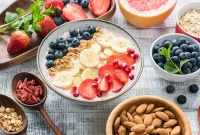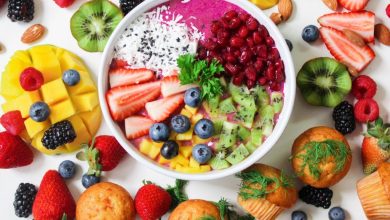Foods to eat every day
How many foods do you eat every day and are there dietary ones among them? Try to make a list of everything you eat for breakfast, lunch and dinner during the week and you will find that your diet is stable.
It certainly has tasty and even healthy products. But the main question is: what does this list fit into the concept of “proper nutrition” and is there enough for you to maintain health. We have prepared a list of foods that you need to eat every day if a healthy lifestyle is your priority.
nuts
This product is not equal in terms of the content of Omega-3 fatty acids. Nuts are a source of protein, they contain magnesium and B vitamins, as well as vitamins A and E.
For health, it is recommended to eat a handful of nuts per day – 50 g is enough.
Almonds reduce the level of total cholesterol. The Brazil nut contains selenium, which is recognized as an excellent antioxidant. Hazelnuts lower the risk of heart disease, and walnuts improve brain function.
Green vegetables and herbs
It is a source of fiber, pectin’s, vitamins and minerals, as well as chlorophyll. It is this pigment that gives vegetables their green color. Chlorophyll helps to remove toxins, increases hemoglobin levels, and also reduces inflammation, slows down aging of the body and maintains the health of the nervous system.
Spinach, lettuce, cucumbers, asparagus, all types of cabbage – scientists recommend eating up to 800 grams of green vegetables per day. At the same time, for those who are striving to lose weight, there is good news: the energy value of green vegetables is close to zero and eating these products will not affect weight gain.
Spinach and other leafy greens paired with fats (olive oil, for example) help the body absorb carotenoids, antioxidants that reduce the risk of cancer.

Berries
Berries are primarily antioxidants, as well as fiber and a bunch of vitamins and minerals. Including them in your daily diet, you make a gift to the body.
It is preferable, of course, to eat them fresh, adding to cereals, yogurts, fruit salads. But they are also useful in the form of compotes.
The berries contain anthocyanins, which reduce inflammation, and quercetin, which slows down the process of memory loss.
These products help to quickly eliminate the feeling of hunger and do not contain many calories. Particularly useful:
blackberries are a source of folic acid and B vitamins;
blueberries are a source of manganese, vitamins C and E;
cranberries are a source of proanthocyanins, which stop the growth of bacteria, protect against microbes and viruses;
raspberries, which are recommended for the prevention of type 2 diabetes and visual impairment;
strawberries are a source of iodine, manganese, potassium, copper, magnesium, riboflavin and even omega-3.
Legumes
On the one hand, legumes are a rather heavy food and you should not get carried away with it. On the other hand, beans, peas, lentils, chickpeas, mung beans are high in vegetable protein, fiber and biologically active plant compounds known as phytoestrogens.
A number of studies have shown that legume phytoestrogens reduce the risk of developing prostate cancer by 20%.
Spices
With them, any dish becomes tastier and more aromatic. Not without reason in the Middle Ages, spices were worth their weight in gold, and pepper was a currency: the wealthiest people were called “pepper bags”. Spices have different properties.
Turmeric relieves inflammation in liver cells, helps cleanse toxins.
Ginger has an anti-inflammatory effect. It is recommended to be consumed after workouts as it helps to soothe aching muscles. Ginger can also reduce nausea.
Cinnamon contains phytochemicals that speed up carbohydrate metabolism.
Oregano, or oregano, contains thymol. This spicy herb is recognized as the plant with the highest antioxidant activity.

cereals
Porridge in the morning is a guarantee of health. Cereals contain not only fiber and B vitamins, but also slow carbohydrates, which give satiety for a long time, which means they contribute to weight loss, as they reduce the risk of impulsive snacking on harmful foods. The most useful cereals for daily diet:
Quinoa
Just one cup of this cooked cereal – about 180 grams – provides 2.8 mg of iron. Quinoa contains more protein than many other grains and is rich in folate, magnesium, copper, manganese and many other nutrients.
Brown rice
In it, unlike polished, all the values of cereal culture are preserved. Brown rice is rich in fiber, B vitamins, folic acid, iron, magnesium, zinc, iodine and selenium. With regular use, toxins are removed from the body, and the work of the gastrointestinal tract and liver, the cardiovascular system, and the brain improves.
At the same time, the calorie content of eggs rarely exceeds 75 calories, which means that this is an ideal product for proper nutrition.
Eggs are a source of fat-soluble vitamins and essential fatty acids. This product contains vitamins A, D, E, K and group B (in particular, B12 and B6), as well as minerals (iron, copper, zinc).
Some time ago, eggs were blamed for raising cholesterol levels, but recent research shows that eggs are safe and healthy.
And finally, eggs are an excellent source of vitamin A: one egg contains 19% of the daily value.



